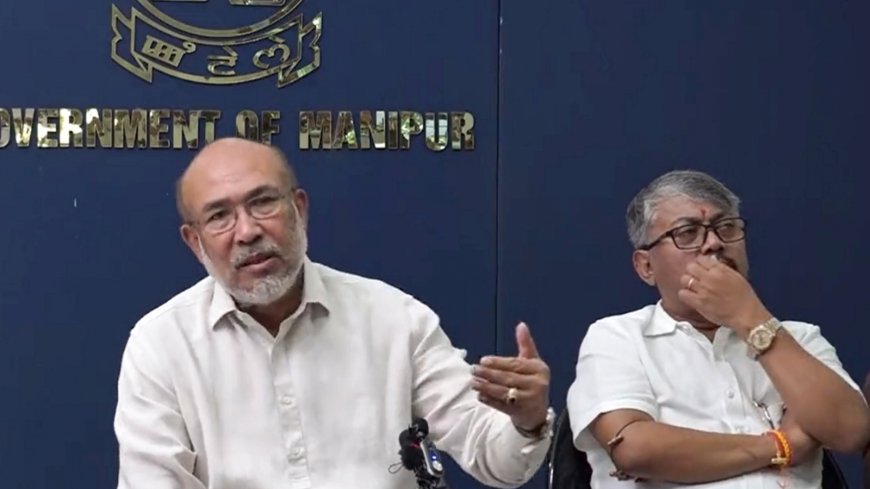Manipur Political Crisis Deepens: Congress Mounts Challenge Against BJP’s Governance Tactics
The Congress has accused the BJP of mishandling Manipur’s governance amid ongoing ethnic unrest. This detailed analysis breaks down the unfolding crisis, political strategies, and democratic implications.

In a sharp escalation of political tensions in the Northeast, the Indian National Congress has intensified its challenge to the Bharatiya Janata Party (BJP) over what it calls a “complete collapse of governance” in Manipur. The state, long marred by ethnic fault lines and insurgency, has been witnessing a protracted governance and humanitarian crisis since early 2023.
With law and order slipping from the hands of the state administration, and public trust in the government rapidly eroding, the Congress has demanded President’s Rule, accusing the BJP-led state government of mishandling the situation and failing to protect citizens across ethnic and regional divides.
Background: Ethnic Unrest and Breakdown of Order
The current wave of instability in Manipur can be traced back to ethnic clashes between the Meitei and Kuki communities, which began in May 2023. These clashes have resulted in over 200 deaths, thousands displaced, and widespread destruction of homes and infrastructure, as reported by The Hindu.
Despite several peace talks and security deployments, the situation remains volatile. Incidents of violence, arson, and attacks on civilians have been reported as recently as April 2025. The state government, headed by Chief Minister N. Biren Singh (BJP), has come under severe criticism for its lack of decisive action and inability to enforce law and order uniformly.
Congress’ Allegations: “BJP Has Lost the Moral Mandate”
In a strongly worded statement, Congress President Mallikarjun Kharge accused the BJP of letting the people of Manipur down. He highlighted that even after repeated pleas from the opposition and civil society, the Prime Minister and Home Minister failed to take effective action.
“Manipur is burning. The Chief Minister is ineffective. BJP is busy protecting its political fortress while people suffer,” said Kharge in a press briefing.
In Parliament, Congress MPs have called for invoking Article 356 of the Constitution to dissolve the state government and place the region under President’s Rule, citing a constitutional failure.
Detailed ground reports by Scroll.in and India Today have documented repeated failures of the administration to respond to violence, restore internet connectivity, and maintain trust among tribal and valley communities.
BJP’s Response: “Congress Playing Political Games”
The BJP, both at the state and national level, has dismissed Congress' claims as “opportunistic politicking.” Union Home Minister Amit Shah, who visited the state in mid-2023, has reiterated that the Centre is committed to restoring peace in a phased manner.
BJP leaders argue that complex issues of identity, land rights, and insurgency cannot be solved overnight, and accuse the opposition of using the crisis to regain political relevance in the Northeast.
In a recent statement, BJP National Spokesperson Sambit Patra said:
“The Congress has no moral authority to question our governance when it did nothing during similar crises in the Northeast in its own tenure. We are working towards reconciliation, not sensationalism.”
However, critics argue that the Centre’s delays in holding all-party meetings and the absence of the Prime Minister from direct on-ground engagement have worsened the crisis.
Civil Society and Public Sentiment
Across Imphal, Churachandpur, and other affected regions, public sentiment remains tense. Multiple reports, such as those published by The Wire, indicate that communities feel neglected and unheard.
Human rights groups like the Northeast Human Rights Council (NEHRC) have demanded independent investigations into police inaction and mob violence. Meanwhile, internet shutdowns—some stretching over several months—have drawn condemnation from digital rights groups including Internet Freedom Foundation (internetfreedom.in).
Moreover, the women-led protests in Manipur, particularly the Meira Paibi movement, have gained international attention for their peaceful yet powerful stand against state and insurgent violence alike.
Constitutional Crisis or Political Strategy?
As the crisis drags on, constitutional experts have raised alarms over the deteriorating federal structure. According to Supreme Court lawyer Sanjay Hegde, the situation may now warrant judicial or presidential intervention under Article 355 and Article 356, as governance has become “non-functional in critical regions of the state.”
Legal publications such as Bar & Bench have pointed out that the continued failure to ensure equal protection under the law raises serious questions about the rule of law in Manipur.
The Road Ahead: What Are the Options?
1. Imposition of President’s Rule
If the Centre concedes that constitutional machinery has broken down, it may recommend President’s Rule, which would bring temporary relief and federal oversight, but also invite political backlash.
2. All-Party Coordination Committee
Congress has proposed setting up a bipartisan crisis committee to monitor and mediate peace efforts. This could foster trust and prevent further polarization.
3. Truth and Reconciliation Commission
Long-term stability may require an independent body to document, assess, and propose restorative justice for victims on all sides.
4. Re-election Demand
A growing segment of civil society is calling for fresh state elections, arguing that the current government no longer represents the will of the people.
Conclusion
The crisis in Manipur has gone beyond regional unrest—it is now a test case for India’s federal integrity, democratic resilience, and political accountability. As the Congress steps up its challenge to the BJP, the nation watches closely.
Whether through President’s Rule, political negotiation, or popular uprising, Manipur will demand answers. And Indian democracy must respond.


















































